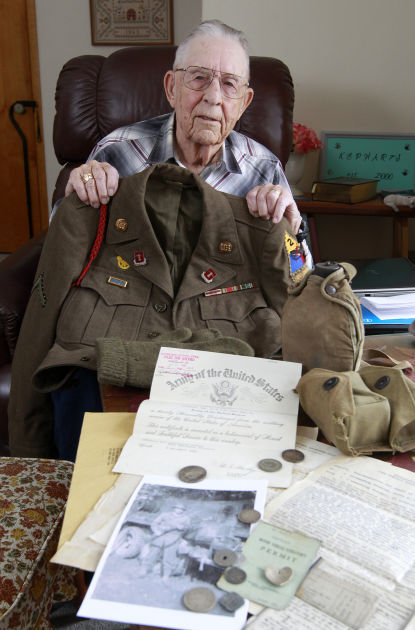Iowa Gold Star Military Museum at the Camp Dodge Joint Maneuver Training Center has held an observance to commemorate the 70th anniversary of the Battle of the Bulge. Veterans of the battle and in attendance at the ceremony received special recognition.
During the memorial, veterans recounted their experiences of the battle. One soldier remembered how he and his comrades dined with a Dutch family, in Heerlen near Maastricht.
The family had befriended the American soldiers and let them have a hot shower and use their home as a rare treat for the soldiers. The soldiers were so grateful since they were in uniform for weeks on end without bathing. They even planned to go back and spend Christmas with the family; the soldiers were able to get a ham and some coffee for the celebration. However Germany’s attack at the Battle of the Bulge prevented the soldiers from celebrating with the family.
The soldiers instead were heading 100 miles to the south into Belgium, in snow, fog, and freezing temperatures, since the Germans had broken American positions.
In the battle more than 19,000 Americans were killed and 62,000 American soldiers were injured over the few weeks of the battle. It was the bloodiest for American troops during World War Two.
The first nine days saw Allied troops having to pull back, but once the fog lifted, American aircraft was able to hit German positions, and the American ground troops could advance. Veterans believe the Battle of the Bulge was Germany giving the war one last push so they could negotiate better at the end.
Veterans remembered the concentration camps and recalled how the SS troops, who ran the camps, were some of the worst offenders.
The German defeat at the Battle of the Bulge enabled the Americans to head on to Germany and victory in the spring of 1945. One veteran’s division was ordered to build portable floating pontoon bridges so that American troops could cross rivers as they headed on to Germany. They received a Presidential Unit Citation for setting up a Rhine River crossing, the WCF Courier.com reports.
Some of the temporary bridges were attacked by remaining German forces, but with Soviet forces coming in from the opposite direction the Germans were finally cornered. Veterans remember the Soviet troops being a little uncooperative and at one point blocked American troops from leaving Berlin for several weeks as they controlled a main road out of the city.
